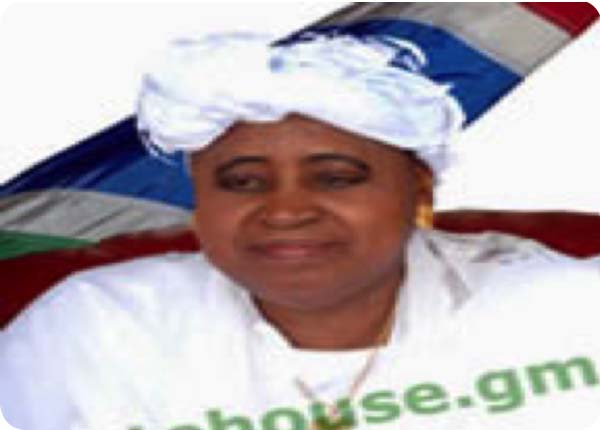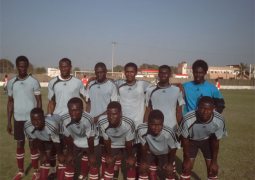
Delivering her speech, the Vice President said: “The Gambia has made commitments to international legal instruments on advancing women’s rights and gender equality. This is demonstrated in the Constitution of The Gambia and the Gender and Women’s Empowerment Policy (2010-2020) all of which paid special attention to gender equality.”
She said the Government of The Gambia has taken further concentrated actions to ensure that women’s rights are promoted and protected.
She said to this effect, in addition to the Women’s Act 2010 which is a domestication of the CEDAW, two acts have been adopted namely, the Domestic Violence and the Sexual Offences acts in 2013.
“I am pleased to inform you that remarkable achievements have already been made in reducing violence against women and girls. The culture of silence is fading away faster than expected, as more and more cases of sexual violence are being reported,” she said.
She added that despite the considerable progress made during the past 20 years, limited resources and capacity in gender mainstreaming and policy analysis, coupled with limited requisite skills in production and value addition, as well as limited access to market opportunities and entrepreneurship continue to impede women from getting out of poverty.
Violence against women, high maternal mortality, high attrition rate of senior and trained health staff, among others, remain a challenge.
She said the government complemented by the efforts of the First Lady Madam Zineb Yahya Jammeh and OAFLAGAM have also taken steps to eradicate cervical and breast cancer mainly through screening and vaccination of young girls age 9-15 for the prevention of cancer.
Regarding HIV & AIDS, the 2013 DHS indicated the prevalence of HIV as 1.9 per cent for 15-49 years.
For women age 15-49, the prevalence ratio is 2.1% against 1.7 per cent for men.
Women continue to be more affected by HIV/AIDS in the country, and The Gambia has made significant achievements in the scale-up of comprehensive HIV treatment, care and support care services.
VP Njie-Saidy said these notable achievements include a decline in new infections, decline in morbidity and mortality related to HIV and AIDS and that more people are put on treatment.
Additional efforts are being made to achieve universal access to a comprehensive prevention, treatment and care package in the areas of prevention of mother to child transmission of HIV/AIDS.
In the areas of education, they have more girls in senior secondary schools and in university.
The completion rates at the Upper Basic level for girls were 56.3 per cent in 2010 and 63.3 per cent in 2014.
At the Senior Secondary School, level the gross enrollment rate for girls increased from 30.6 per cent in 2010 to 39.2 per cent in 2014 (an overall period growth rate of 8.6 per cent).
At the Lower Basic School level, the GER for girls increased from 89.1 per cent in 2010 to 98.7 per cent in 2914 and from 65.6 per cent in 2010 to 68 per cent in 2014 in the Upper Basic Cycle.
This achievement has been made possible through support from the President’s Empowerment of Girls Project, the free education policy and a well-coordinated education system.
A scholarship of excellence has been provided by the ECOWAS Gender Development Center to five girls in technical and vocational training at the Gambia Technical Training Institute and the Kwame Nkrumah University in Ghana.
Young women are catching up with their male counterparts at university, and in other tertiary and vocational training areas in the non-traditional fields of science and technology innovations.
In the area of leadership, women partake in decision-making processes in all spheres of national development.
“I am happy to report that since the advent of the Second Republic, cabinet has registered 40 per cent female representation, which is above the 30 per cent recommended by international standards.”
Three women served as speakers of the National Assembly, two as deputy speakers, six were elected and six nominated as National Assembly Members.
In the Judiciary sector, eight women have served as high court judges, three as masters and registrars of the high court, two as sheriffs of The Gambia while eight serve as magistrates one of whom is a principal magistrate.
At the local authority level, there is a female Governor, two female deputy Governors, eleven elected and seven nominated female area councilors.
There are three female vice chairpersons of area councils, a deputy mayoress and seven female village heads.
In the area of poverty alleviation, the Government recognizes the need to reduce women’s poverty as a major pillar in all the development programmes.
The establishment of the Enterprise Support Centre Project (EMPRETEC model) aims at a transformational change in agriculture and industry to be achieved through unleashing the potentials of small scale farmers and micro and medium scale enterprises (MSME) by 2017.
Through entrepreneurial skills training and provision of a comprehensive range of small business advisory services, it has benefitted about 310 people, 40% of whom are women.
The VP further stated that The Gambia like many of its peers globally is yet to attain the requisites 30 per cent representation at all levels.
“As we believe that women’s empowerment is the key to the achievement of AU Vision 2063, Vision 2020, the MDGs and Beijing Platform for Action, the Government of The Gambia continues to accord high priority to the enhancement of the status of women and children.
“I also wanted to re-affirm our solidarity with the statements delivered by the G77 and China and the group of African states,” she said.



